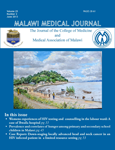
|
Malawi Medical Journal
College of Medicine, University of Malawi and Medical Association of Malawi
ISSN: 1995-7262
Vol. 26, No. 2, 2014, pp. 45-49
|
 Bioline Code: mm14011
Bioline Code: mm14011
Full paper language: English
Document type: Research Article
Document available free of charge
|
|
|
Malawi Medical Journal, Vol. 26, No. 2, 2014, pp. 45-49
| en |
Orthodox versus unorthodox care: A qualitative study on where rural women seek healthcare during pregnancy and childbirth in Southwest, Nigeria
Okafor, I. P.; Sekoni, A. O.; Ezeiru, S. S.; Ugbaoaja, J. O. & Inem, V.
Abstract
Introduction
Utilization of orthodox health facilities for maternal health services is
determined by factors operating at the individual, household, community
and state level. The prevalence of small family norm is one of the
identified variables operating within the community which influences the
decision of where to access care (orthodox/traditional). The objective
of the study was to determine the use of orthodox versus unorthodox
maternity healthcare and determinants among rural women in southwest
Nigeria.
Methods
A qualitative study was done and involved three focus group discussions.
A semi-structured interview guide was used to collect information from
women of reproductive age group within a rural Local Government Area
in Lagos state.
Results
Most of the women access some form of healthcare during pregnancy,
orthodox, unorthodox or both. Those who patronize both services
concurrently do so to benefit from the two as each has some unique
features such as herbal concoctions for traditional, ultrasound and
immunization of babies for orthodox. Traditional belief exerts a strong
influence on decision of where to access maternal healthcare services.
Actual place of delivery is determined by individual and household factors
including financial resources.
Conclusion
Rural women utilize one or both orthodox and unorthodox maternal
health services for different reasons. Ward Development Committees
should be strengthened so as to reach the communities, educate and
convince women to dispel myths which limit their use of orthodox care.
Training and monitoring of Traditional Birth Attendants (TBAs) are vital
to eliminate harmful practices. We also recommend improved financial
access to orthodox healthcare.
|
| |
© Malawi Medical Journal
Alternative site location: http://revista.uft.edu.br/index.php/jbb/index
|
|
